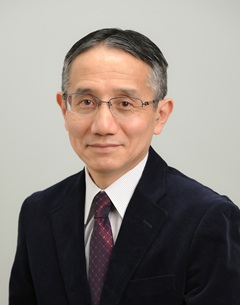
April 2025
Yoshihiro Sakoda
Dean, School of Veterinary Medicine
Aiming to Produce Veterinarians and Veterinary Scientists who Work Globally
I have been appointed as the Dean of the School of Veterinary Medicine in April 2025. Thank you for visiting our website.
The School of Veterinary Medicine, Hokkaido University began operations in 1910 as the Laboratory of Veterinary Medicine, Department of Livestock Science, at the Agricultural College of Tohoku Imperial University. This organization became the Department of Veterinary Medicine in 1949 and then the School of Veterinary Medicine in 1952. Since 1955, the school has produced more than 2,800 graduates.
Most students wishing to enter the School of Veterinary Medicine seem to like animals or hope to cure the diseases of animals, especially pets. Maintaining the good health of pets through the diagnosis and treatment of animal diseases to make the owner feel at ease is an important mission of veterinary medicine. However, veterinary medicine has a wide variety of missions. One of the major missions of veterinary medicine is to take responsibility for maintaining the health of all animals on the earth, including pets, food-producing animals (production of animal proteins), wild animals, and humans, and the health of the ecosystem comprised of these animals as a concept of “One Health”. Accordingly, veterinarians are also expected to improve the productivity of livestock products and secure their safety by enhancing feed management technology for food-producing animals, conserve the ecosystem through the protection of wild animals and other measures, prevent the occurrence of zoonosis, which is transmitted from animals to humans, and promote public health such as food hygiene. Veterinary medicine is a part of life science and plays an important role in the analysis of life phenomena and the development of pharmaceutical products.
Veterinarians are also expected to engage in global activities. The development of traffic networks and means of transportation has facilitated the movement of people, animals, and livestock products beyond national boundaries. In this situation, there are numerous issues that should be tackled in an international framework, such as the securement of the safety of livestock products to be imported and exported, the control of high pathogenicity avian influenza, foot-and-mouth disease, and other transboundary infectious diseases that cause major socioeconomic damage, and response to zoonoses that occur regardless of national boundaries. Against this background, there is a need to develop international-level veterinarians. Japan is no exception, and the development of internationally competent veterinarians through world-class veterinary education is an important issue affecting national interests.
The School of Veterinary Medicine, Hokkaido University established the Cooperative Veterinary Education Program with the Obihiro University of Agriculture and Veterinary Medicine in academic 2012 to promote advanced veterinary education using Hokkaido as a research and education field. Hokkaido University has an advantage in small animal clinical medicine, basic veterinary science, life science, and infectious disease fields. The Obihiro University of Agriculture and Veterinary Medicine has an advantage in large animal clinical medicine and food hygiene fields. By integrating these advantages, we have built an international-level education system, which was difficult for a single university to achieve. After entering the school, students can receive education from the faculty members of both universities. It takes three hours by JR train between Sapporo and Obihiro. It will never be a short distance. However, you can learn valuable face-to-face practical skills in Sapporo and Obihiro. In addition, students can take classes offered by both universities in their hometowns using information and communication technology. Experiencing two universities is advantageous not only for learning but also for campus life. We hope that students will take advantage of such a favorable environment to lead meaningful campus lives.
To work in society as a veterinarian, not only skills as a veterinarian but also judgement based on scientific thinking, an ability to find and solve problems, communication skills and other social skills, as well as cooperativeness, independence and other basic qualities are necessary. To work globally, it is necessary to respect diverse cultures while maintaining a firm identity. The School of Veterinary Medicine not only provides specialized education but also fosters basic qualities. We welcome students with high aspirations and a willingness to study hard in this favorable environment to become veterinarians or veterinary scientists.
